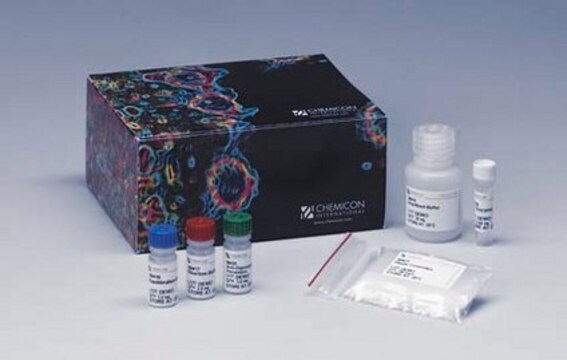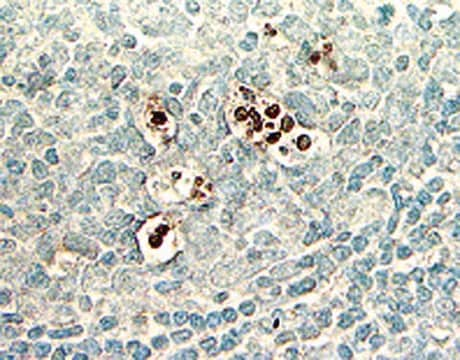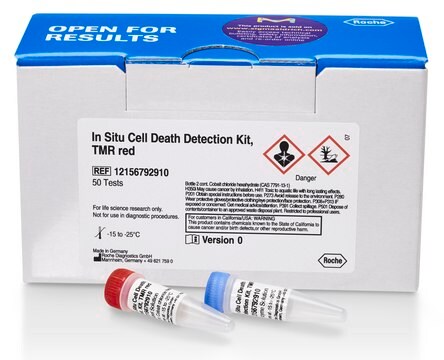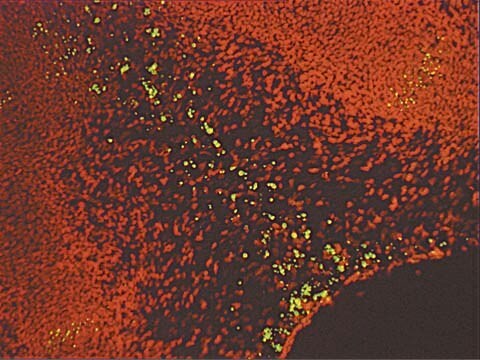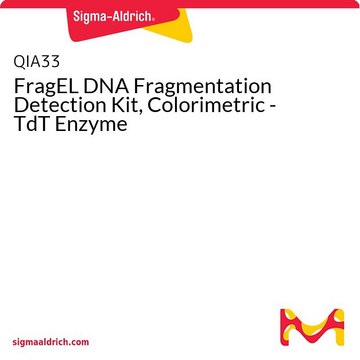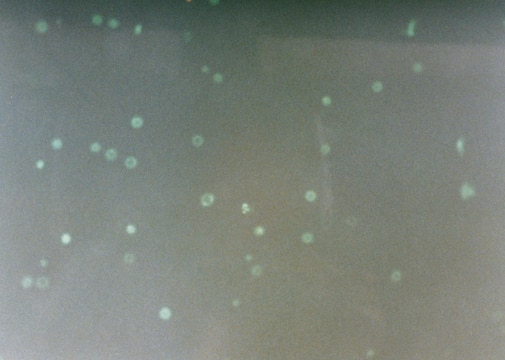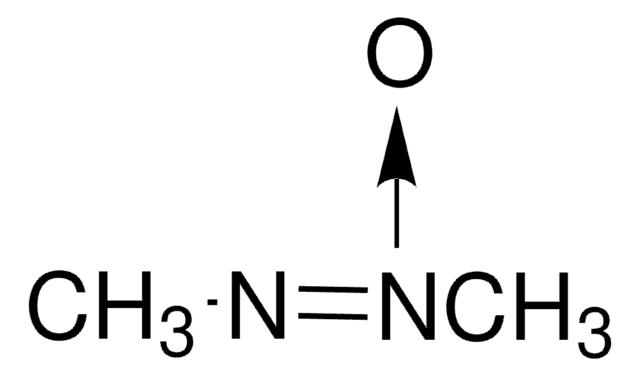APT110
Apo-Direct TUNEL Assay Kit
The APO-DIRECT Kit is a single-step staining method for labeling DNA breaks to detect apoptotic cells by flow cytometry.
Synonym(s):
Apoptosis detection kit, TUNEL apoptosis assay, TUNEL assay kit
Sign Into View Organizational & Contract Pricing
All Photos(1)
About This Item
UNSPSC Code:
12161503
eCl@ss:
32161000
NACRES:
NA.84
Recommended Products
Quality Level
species reactivity
vertebrates
manufacturer/tradename
ApoDIRECT
Chemicon®
technique(s)
flow cytometry: suitable
detection method
fluorometric
shipped in
wet ice
General description
The CHEMICON APO-DIRECT Kit is a single-step staining method for labeling DNA breaks to detect apoptotic cells by flow cytometry (Li et al. 1995). The kit contains all the reagents required for measuring apoptosis in cells including positive and negative control cells; washing, reaction, and rinsing buffers; and propidium iodide/RNase A solution for counter staining the total DNA.
Application
Research Category
Apoptosis & Cancer
Apoptosis & Cancer
The APO-DIRECT Kit is a single-step staining method for labeling DNA breaks to detect apoptotic cells by flow cytometry.
Components
The following components are included with the APO-DIRECT Kit. Reagent bottles have color coded caps to aid in their identification. Sufficient reagents are provided to process 50 cell suspensions including control cells of approximately 1 x 106 cells per suspension for flow cytometry analysis. The control cells have been fixed as described (under the heading cell fixation procedure) and are in 70% (v/v) ethanol.
Positive Control Cells,Brown cap
Negative Control Cells, Natural cap
Wash Buffer, Blue cap
Reaction Buffer, Green cap
TdT Enzyme, Yellow cap
F-dUTP, Orange cap
Rinsing Buffer, Red cap
PI/RNase Staining Buffer, Amber bottle
Positive Control Cells,Brown cap
Negative Control Cells, Natural cap
Wash Buffer, Blue cap
Reaction Buffer, Green cap
TdT Enzyme, Yellow cap
F-dUTP, Orange cap
Rinsing Buffer, Red cap
PI/RNase Staining Buffer, Amber bottle
Storage and Stability
Precautions and Warnings:
1. The components of this kit are for Research Use only and are not intended for diagnostic procedures.
2. Positive and negative control cells contain 70% (v/v) ethanol as a preservative; wash and reaction buffer contain sodium cacodylate (dimethylarsinic) as a buffer; rinsing and PI/RNase staining buffer contain 0.05% (w/v) sodium azide as a preservative. These materials are harmful if swallowed; avoid areas of contact immediately. See Material Safety Data Sheets.
3. TdT Enzyme will not freeze at -20oC, because it is in 50% (v/v) glycerol solution. Upon warming the TdT enzyme solution, centrifuge the tube for 30 seconds to force all the liquid to the bottom of the tube.
1. The components of this kit are for Research Use only and are not intended for diagnostic procedures.
2. Positive and negative control cells contain 70% (v/v) ethanol as a preservative; wash and reaction buffer contain sodium cacodylate (dimethylarsinic) as a buffer; rinsing and PI/RNase staining buffer contain 0.05% (w/v) sodium azide as a preservative. These materials are harmful if swallowed; avoid areas of contact immediately. See Material Safety Data Sheets.
3. TdT Enzyme will not freeze at -20oC, because it is in 50% (v/v) glycerol solution. Upon warming the TdT enzyme solution, centrifuge the tube for 30 seconds to force all the liquid to the bottom of the tube.
Legal Information
CHEMICON is a registered trademark of Merck KGaA, Darmstadt, Germany
Disclaimer
Unless otherwise stated in our catalog or other company documentation accompanying the product(s), our products are intended for research use only and are not to be used for any other purpose, which includes but is not limited to, unauthorized commercial uses, in vitro diagnostic uses, ex vivo or in vivo therapeutic uses or any type of consumption or application to humans or animals.
signalword
Danger
hcodes
Hazard Classifications
Carc. 1B - Eye Irrit. 2 - Flam. Liq. 2 - Resp. Sens. 1
Storage Class
3 - Flammable liquids
flash_point_f
69.8 °F
flash_point_c
21 °C
Certificates of Analysis (COA)
Search for Certificates of Analysis (COA) by entering the products Lot/Batch Number. Lot and Batch Numbers can be found on a product’s label following the words ‘Lot’ or ‘Batch’.
Already Own This Product?
Find documentation for the products that you have recently purchased in the Document Library.
Customers Also Viewed
Shu-Yi Lin et al.
Journal of the American Chemical Society, 132(24), 8309-8315 (2010-05-27)
Subnanometer photoluminescent gold quantum dots (GQDs) are functionalized with a peptide moiety that contains both nuclear export signal (NES) and nuclear localization signal (NLS) sequences. By taking advantage of its small size and great photostability, the functionalized GQDs are used
Supriya Sen et al.
Nature communications, 4, 1336-1336 (2013-01-10)
SR family RNA binding proteins regulate splicing of nascent RNAs in vitro but their physiological role in vivo is largely unexplored, as genetic deletion of many SR protein genes results in embryonic lethality. Here we show that SRSF3HKO mice carrying
Our team of scientists has experience in all areas of research including Life Science, Material Science, Chemical Synthesis, Chromatography, Analytical and many others.
Contact Technical Service